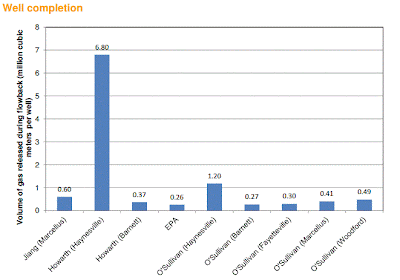Hydraulic fracturing or “fracking” is a technique that creates narrow fractures in rock using water pumped at high pressure so as to extract pockets of natural gas. The water contains small quantities of chemicals and sand to facilitate the process.
While some may consider natural gas as a means of reducing CO2 emissions in comparison to coal, its extraction through fracking has attracted a fair share of controversy on issues such as its potential to create geological instability and ground water contamination.
The figure below illustrates a typical fracking process.
 |
| Illustration by Wikipedia |
From the climate change perspective, many have questioned if fracking is truly able to mitigate CO2 emissions.
Mackay and Stone (2013), in a report commissioned by the DECC titled "Potential Greenhouse Gas Emissions Associated with Shale Gas Extraction and Use" in September 2013, concluded that the net effect of shale gas production on UK greenhouse gas emissions will be relatively small, with the right safeguards in place.
They calculated that the carbon footprint of shale gas extraction and use is likely to be in the range 200 – 253 g CO2e per kWh, which is lower than that of Liquefied Natural Gas (233 - 270g CO2e/kWh). For electricity generation (see chart below), shale gas' carbon footprint (423 – 535 g CO2e/kWh) is also significantly lower than coal (837 – 1130 g CO2e/kWh).
 |
Comparison of the life-cycle emissions for the production of
electricity from various sources of gas, and coal.
Chart from DECC Report titled "Potential Greenhouse Gas Emissions Associated with Shale Gas Extraction and Use"
|
There has nonetheless been divided scientific opinion on the rate of greenhouse gas (GHG) emissions arising from fracking. Apart from CO2, the other GHG of concern is methane. According to the IPCC, methane has a global warming potential 21 times greater than CO2, based on a 100-year time horizon.
For example, there has been an exchange of opinion between Cathles et al (2011) and Howarth et al (2011, 2012) on the life cycle emissions on shale gas. Howarth et al (2011) had proposed that shale gas has a larger GHG footprint than coal. Catheles et al (2011) subsequently raised queries on Howarth el al (2011)'s methodology and results, such as its estimates on the methane gas release. Howarth et al (2012) followed up to published a response which included a comparison of methane release from life cycle analysis shale gas across various studies to substantiate his findings (see table below).
+Comparison.GIF) |
Comparison of published estimates for full life-cycle methane emissions from conventional gas and shale gas, expressed per unit of Lower Heating Value (gC MJ−1).
Table from Howarth et al (2012)
|
It may be interesting to note that Mackay and Stone (2013)'s DECC report commented on Howarth et al's study as being "considered by many to be an outlier" through the chart below.
 |
Gas volumes released during well completion versus
respective studies
Chart from DECC Report titled "PotentialGreenhouse Gas Emissions Associated with Shale Gas Extraction and Use"
|
While studies seem to suggest that GHG emissions arising from fracking are not substantial, I am of the opinion that various operational risks, such as the probability of drill well cracks leading to fugitive GHG release, may not have been examined in detail thus far. More studies would be needed to validate claims on the potential for shale gas extraction as a means to mitigate climate change.
Not withstanding the vibrant debate that will continue to take place within the scientific community, it would be prudent that the existing shale gas industry commits itself to work closely with regulators and ensure that the highest level of safety is practised, through adopt the principle of reducing emissions to as low a level as reasonably practicable (ALARP) in its operations as recommended in the DECC report. Public opinion will also be a key factor that policy makers and industry players have to manage moving forward, given the controversies that fracking has raised.
Hi Joon,
ReplyDeleteThis post is a really useful summary of the ghg impacts of shale gas - it really emphasises how unresolved the present scientific debate is!
I think that it's also important to look at the impacts that shale gas might have on emissions from a global perspective. Increased production in some countries might reduce domestic emissions but if they then just export the other fossil fuels they produce the net effect on global emissions might not be significant. For example coal has displaced gas as fuel for electricity generation in the UK as global coal prices have fallen following an increase in coal exports from the US: http://www.carbonbrief.org/blog/2013/02/preliminary-uk-energy-stats-show-big-jump-in-coal-fired-electricity
I look forward to reading what else you discuss on here. If you're interested, here's my geog3057 blog:
http://green-transition.blogspot.co.uk/
Hi Agnes,
DeleteThank you for sharing your views.
Indeed, one of the key considerations behind the shale gas debate is whether the fossil fuel use avoided by one country may simply be transferred to other countries for their consumption, and therefore resulting in no net reduction when considering the global level as a whole.
One might then suggest that the global community should work together on a framework to jointly reduce fossil fuel use. This in fact is at the heart of the on-going UNFCCC negotiations. Developing countries are calling for Annex I countries to bear responsibility for the tons of fossil fuels that developed countries have historically emitted. They are therefore adamant that developed countries provide financing and technology transfer, before developing countries are willing to negotiate any mitigation obligations.
The example you have quoted is indeed very interesting, and goes some way to illustrate how economics and bottom lines typically rule over environmental considerations.
I'll certainly be happy to follow your blog on the economics vs environment debate. Looks interesting!